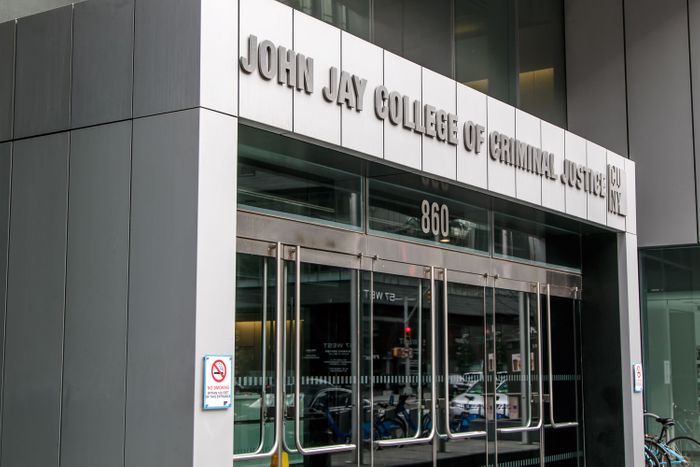CUNY’s John Jay College of Criminal Justice in Hell’s Kitchen Photo: Roman Tiraspolsky/Shutterstock
By Josefa Velasquez, THE CITY
After a roughly three-month wait, 24-year-old Jesus finally received an email on Thanksgiving detailing how much tuition assistance he’d be getting under a recently enacted New York law that opens state financial aid to undocumented immigrants.
“You have been offered an award under the NYS Tuition Assistance Program in the amount of 0.00. Please let us know if you intend to accept or decline your award,” the note read.
Jesus earned about $25,000 last year as an assistant manager of a restaurant. He was hoping to get at least $1,200 in financial aid to cover about a third of the $3,640 tuition for the semester.
“It was beyond the crappiest feeling in the world,” Jesus, who did not want his last name published because of his immigration status, told THE CITY.
Jesus’ senior year at CUNY’s John Jay College of Criminal Justice has been “rough,” he said. He called the email from the Higher Education Services Corporation (HESC) — the state agency that oversees financial aid — “an insult.”
“A slap in the face. They could have said, ‘Unfortunately, you were denied the scholarship,’” said Jesus, who arrived in the U.S. from Mexico when he was an infant.
Denied Without Explanation
Jesus isn’t the only applicant awarded $0.00.
Immigration advocacy groups throughout the state said more than a dozen of their members have been denied financial aid after applying via the New York DREAM Act — a program designed to give undocumented students, known as “Dreamers,” a shot at public help paying for college.
Since the denials came without any explanation, the rationales behind them remain unclear to the applicants — fueling confusion about the process. Jesus suspects he may have earned too much to qualify.
Since he applied for state financial aid through the New York DREAM Act in August, Jesus’ experience has been marred by complications.
Filling out the application was simple enough. In October, Jesus received an email denying him aid because of missing paperwork. He contacted Assemblymember Catalina Cruz (D-Queens) — a former “Dreamer” who immigrated to New York from Colombia as an undocumented child — and asked for help.
With Cruz’s assistance, a HESC representative told Jesus he had been subject to a processing glitch experienced by several applicants, and assured him he should be approved for some financial aid, he recounted.
But he didn’t have a lot of confidence, even then. “I got a feeling that something wasn’t right about the program,” Jesus said.
Several weeks passed with no updates until he got the email offering zero dollars.
Numbers Still Unknown
The DREAM Act, which stalled in a Republican-controlled State Senate for years, passed last January after the Legislature shifted to two-house Democratic Party control. The measure opened state tuition assistance to undocumented immigrants.
Based on an estimate that 4,500 undocumented people graduate from New York high schools annually, state lawmakers included $27 million in their current-year budget for the new crop of students accessing state financial aid and scholarship programs.
Overall, 47,000 people in New York City are eligible to benefit from the DREAM Act, according to the Mayor’s Office of Immigrant Affairs, the bulk of whom reside in Queens.
But outreach and education on how undocumented students should apply for financial aid “didn’t happen,” said Cruz, whose office has received several calls from frustrated applicants who reported getting little, if any, guidance from HESC.
“Applicants during the initial months were faced with more confusion and uncertainty, not less,” Cruz told THE CITY. “I am grateful the application process is now working better, but several students expressed anger to me because of the lack of a proper rollout and I agree with them.”
Assemblymember Carmen De La Rosa (D-The Bronx), who sponsored the bill in her chamber, has been in talks with HESC over how to smooth out glitches. That could mean more staffing or a hotline to answer applicants’ questions, she told THE CITY.
So far, it’s been impossible to quantify the program’s success or how much financial aid has been awarded to undocumented students since the law went live in July, ahead of the beginning of the school year.
Data on how many students have applied isn’t yet available, said HESC President Guillermo Linares, a former state Assemblyman who carried the bill.
“At this point, we do not have a number,” Linares told THE CITY in mid-December. “We’re in the thick of it. We’re engaged in processing them.”
Strict Income Limits
For immigrant students, applying for college or financial aid presents unique challenges.
Students may be the first in their family to go to college. Parents may not speak English or be able to provide guidance on the application process. And undocumented parents may not have Social Security numbers or tax documentation to prove their income — leaving students to figure out eligibility and paperwork on their own.
Alex — a 25-year-old undocumented sophomore at Borough of Manhattan Community College — also received an email granting him $0.00.
He reached out to HESC through a public support line, but noted, “I didn’t hear anything back from them.”
He contacted an immigration advocacy group for help. Like Jesus, Alex suspects he received a $0.00 award because he earned too much.
Alex made $24,000 working at a moving company, above the $10,000 Tuition Assistance Program income limit for single, independent students. For students who are still dependents, the family income limit for TAP is $80,000.
“If you factor in rent, food, transportation, and other basic needs plus school payments, that’s all of the $24,000,” Alex told THE CITY. “I would have been grateful for anything, but I guess I make too much to even get any help. It’s as if you need to have little to no money to even feed and house yourself in order to get help.”
This story was originally published on [January 14, 2020] by THE CITY.”

